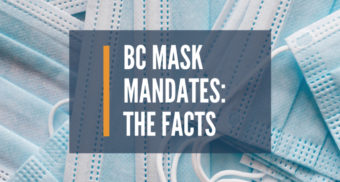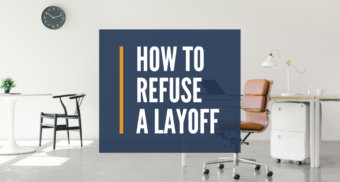COVID-19, Layoffs and Long-term Disability Claims

Applying for Long-term Disability Insurance during COVID-19 pandemic
As the world around us begins to grasp the impact of COVID-19, we have all come to understand that this is much more than a health crisis. The economic impact of this crisis is impossible to quantify, but what is certain is that everyone is affected in numerous ways. Employees face new realities in the workplace. Even if you are fortunate enough to avoid getting sick, many people face layoffs, termination and bankruptcy. And even those that are fortunate enough to continue to work face unanswerable questions about the futures of their livelihoods.
TABLE OF CONTENTS
What is LTD coverage?
LTD and Layoffs
Applying for LTD Coverage
Denied Despite Doctor Support
Appealing an LTD Denial
Get Help with your LTD Claim
This blog will explore a Canadian worker’s right to apply for long-term disability coverage due to the COVID-19 pandemic (coronavirus outbreak). We will also explain what you should do if the insurance company denies your long-term disability claim.
What is long-term disability (LTD) coverage?
LTD coverage is insurance that pays benefits if you become disabled from working. Under most LTD insurance policies we see, this means that to qualify for benefits, you would have to show that you are unable to continue to work because of a medical condition. The disability can be physical, psychological, cognitive or emotional, or a combination of the above.
In most cases, if you qualify for LTD coverage, once benefits become payable, they will pay between 60-66% of your pre-disability income. Some policies cover a lesser amount, and some cover more, but in all cases, the value of the monthly benefits is very significant if you can no longer work and do not have any income coming in. Most policies will pay benefits for those qualified up to age 65.
Do I have LTD insurance coverage?
If your employer provided you with a benefits package, you likely also have insurance for LTD benefits. Many who are not covered through a group employment benefits plan have purchased a private LTD plan. If you have been insured under a group employment or private LTD plan, then you very likely have coverage for LTD benefits, even if you’ve been laid off or terminated from your job.
As a condition of most employment in Ontario, BC and most other provinces, when an employer ends your employment relationship (termination, layoffs, etc.) they are required to extend your benefits coverage for a certain amount of time.
That means that if you had LTD Benefits Insurance while you were working, this would continue even after a layoff or termination arising out of the COVID-19 crisis, at least for some period of time.
Related
Employment Rights During COVID-19 Pandemic
I can’t work because COVID-19 is affecting my mental health
If you develop a condition that prevents you from working while you have coverage, then you are entitled to claim for and receive LTD benefits for as long as you remain disabled, even beyond the time that your benefits are extended after you are let go.
An Example
If Dan loses his job with his employer, he will continue to have LTD coverage for a period of time beyond his termination.
The amount of time his benefits will extend beyond the date he is let go will vary depending on his circumstances, but for this example we will assume that Dan’s benefits were extended for 8 weeks after Dan is let go from his job.
If at any time during that 8 weeks, Dan develops a condition that would prevent him from returning to work – regardless of whether or not a job is available – he is entitled to claim for and receive LTD benefits.
Even after the 8-week period of coverage ends, if Dan continues to remain disabled from working, he would continue to be entitled to receive LTD benefits for as long as his disability continues.
> back to top <
I’ve been laid off by my employer. Do I still have coverage?
In most cases yes. If you were covered for LTD Insurance benefits while you were working, these benefits will continue in most cases for some period of time. This can vary depending on your specific circumstances, but if you become disabled after being laid off during the COVID-19 pandemic, you can still bring a claim for LTD insurance benefits.
How Will COVID-19 Affect My Long-term Disability Claim?
Even if I have coverage, will I qualify for LTD benefits?
While every policy is a bit different, the vast majority of LTD policies will pay benefits provided you can show that you have a disability that prevents you from working. During the first two years of eligibility, most policies will pay benefits if you are disabled from your own occupation. After two years, the test becomes a bit harder and is whether you are disabled from any occupation you are qualified for by training, education, and experience.
In some cases, whether or not someone is entitled to LTD benefits is very obvious. For example, if Jerry works in construction and is in an accident that results in the loss of the use of his legs, nobody could argue that he is able to return to his job. Jerry would qualify under virtually any LTD Insurance policy, at least for the first two years.
Other cases are less obvious though.
Mental health claims are a perfect example of this. Many people suffer from depression, anxiety, and a wealth of other mental health issues. Like with most conditions, this can lie on a spectrum – some people have severe cases that prevent them from working while others have milder issues that can be managed with treatment and allow them to continue to earn an income. Because mental health claims don’t show up on an x-ray or in a blood sample, there can be more doubt cast on the severity of such claims.
What is critical for all claims – whether physical, emotional, psychological, cognitive or a combination – is not the diagnosis of your particular issue. Instead, what is actually important is having the opinion of your treating doctor(s) and treatment professionals that the impact of your condition(s) is significant enough that you aren’t able to work.
An Example
Sue is a single mother of two and has been a bookkeeper for a small restaurant chain for 10 years. She has a history of anxiety going back to her childhood. She has managed this with medication for years and this has allowed her to continue to work and lead a normal life.
Unfortunately, after the province shut down restaurants, she was laid off. Her stress and anxiety have spiked significantly, and in addition to her anxiety, she has become severely depressed. After seeing her family doctor, she was prescribed a higher dose of her present medications and given new prescriptions to help her cope with depression and sleep issues.
Even though Sue was able to manage her anxiety before she was laid off, her present situation has gotten to the point where even if her job was available, she wouldn’t be able to return. Her family doctor agrees.
Sue is entitled to bring a claim for LTD benefits. Because her doctor supports that she is unable to return to work because of her medical condition (anxiety and severe depression), she would qualify under most LTD policies to receive benefits.
> back to top <

I have coverage and my doctor has told me I can’t work. What do I do now?
If you have lost your job and while still covered for LTD benefits, you develop a condition that would prevent you from returning to work, or if you become disabled while you are still employed, the next step is to apply for LTD benefits.
In most cases, LTD benefits are not payable immediately. There is usually a “waiting period” (sometimes called and “elimination period”) that has to expire before your Insurer has to start paying your LTD benefits. The waiting period is typically 3-6 months, but in some cases can be zero months, and in others a year or more.
Most policies will require you to apply for your benefits within a certain period of time following the end of the elimination period. For example, if the elimination period is 3 months, and the deadline requires you to apply within 6 months after the elimination period, you would be required under the policy to submit your application within 9 months of first going on medical leave. However, there is no reason to wait until the deadline and in most cases, you should make your application well BEFORE the elimination period has expired. While you likely won’t get a final decision until the expiry of the elimination period, applying early will provide an opportunity to ensure all components of the application have been properly submitted.
The application package can typically be obtained from your employer’s HR representative, or if a private policy, from your broker or directly from your insurer. There are usually three components to the application. One is a Member Statement which you fill out. The second is the Attending Physicians Statement which is to be filled out by whichever doctor is providing the primary care for your condition. This is in most cases going to be your family doctor, but in some cases might be a treating specialist for acute care of a disease, or a psychiatrist. It is recommended that you fill out your member statement with your family doctor where possible to ensure that the information provided is accurate and complete (both for you and your doctor). Finally, there is a form that your employer needs to fill out, which will outline your job duties/responsibilities and the physical, cognitive and psychological demands of your job.
While obvious cases are usually approved, many other cases which should be approved are initially rejected by Insurers. This is especially true with claims that have a mental health component. It is our experience that such claims are frequently denied at the outset and on appeal, despite clear statements from treating doctors that their patient is completely unable to return to work.
> back to top <
I Was Denied Long-term Disability Caused by COVID-19 (Coronavirus)
I’ve been denied but I don’t understand why. My doctors all say I can’t work.
This is a very common issue that we see literally every day. Your treating doctors are all in agreement that you can’t work, and yet, once your insurer reviews the file, they tell you that in fact, your claim is denied because you are able to work. In most cases, this is done even though the Insurer has not hired any doctor to assess you. In many cases, the Insurance company doesn’t even ask a doctor to review your file.
Huh?
If this doesn’t make sense to you, rest assured, you are in good company. Your treating doctors are in the best position of anyone to know and understand whether or not you are medically able to work.
But Insurance companies are in business to earn profits for their shareholders. The more claims they pay, the less money they make. As a result, the insurance adjusters hired to decide whether or not you are entitled to receive LTD Benefits often go to great lengths to manufacture a justification to deny your claim.
Sometimes they will say that you aren’t getting “appropriate treatment”. Other times, they will say there is “insufficient medical evidence”, or perhaps they will simply say that you don’t “meet the test for total disability”. Whatever the reason given, if your treating doctor is telling you that you are not able to work, you very likely are entitled to receive LTD Insurance benefits, even if your Insurance companies denies your claim.
> back to top <
I’ve been denied LTD benefits. Should I appeal?
In a word, no. Unless your doctor(s) can provide significantly different information, appeals are very rarely approved. This is just going to delay the process by months which will delay you getting the benefits you are entitled to.
It is useful to understand that the Appeal of an LTD Denial is not required by law nor is it required in your policy. It is a process created and designed by Insurers in an effort to maintain control of the process even when they aren’t paying you the benefits you are entitled to. Typically, the appeal is decided by the same people who made the decision to deny your claim in the first place. It is not going to an independent judge or arbitrator.
Insurers are in business to make profits for their shareholders and they do that by denying claims as early as possible. Once they have found a justification for doing so, no matter how weak, it is very difficult to get them to willingly change their minds, especially when they continue to control the process.
OK, so if don’t appeal, what do I do?
The only reliable way to take control of the process away from the Insurer and to get them to act reasonably is to bring a legal claim. Once the legal claim starts, the Insurer suddenly takes a very different tone.
Once we have been retained to start a legal claim for our clients, the process is usually very straightforward.
First and foremost, our clients will never have to deal with their insurers. Once we’ve been retained, all communication goes through our office. Our clients are free to focus their attention on recovery, treatment, and dealing with their own response to their personal situation, without having to deal with an insurance company calling for updates and harassing them regularly.
Most files are settled within several months, although sometimes it can take a year or longer. While your claim is ongoing, you will be updated as your case develops and have the full resources of the firm at your disposal to answer any questions that may arise.
Best of all, you will never be out of pocket for legal fees or expenses. You don’t have to pay for a consultation, you don’t have to pay us a retainer to start the case, you don’t have to pay for any expenses as the case goes along, and you won’t be invoiced while the case is still active. Only once your case has resolved and the insurance company has paid does our firm get paid.
> back to top <
I have questions. Who should I talk to?
Call us at 1-855-821-5900 for a 100% free consultation. Regardless of where you are in the LTD Insurance process, we are happy to talk with you and answer your questions, free of charge. You are not required to sign anything nor do you need to give a credit card number. Just ask questions and get answers from one of our disability lawyers in Ontario or BC.





